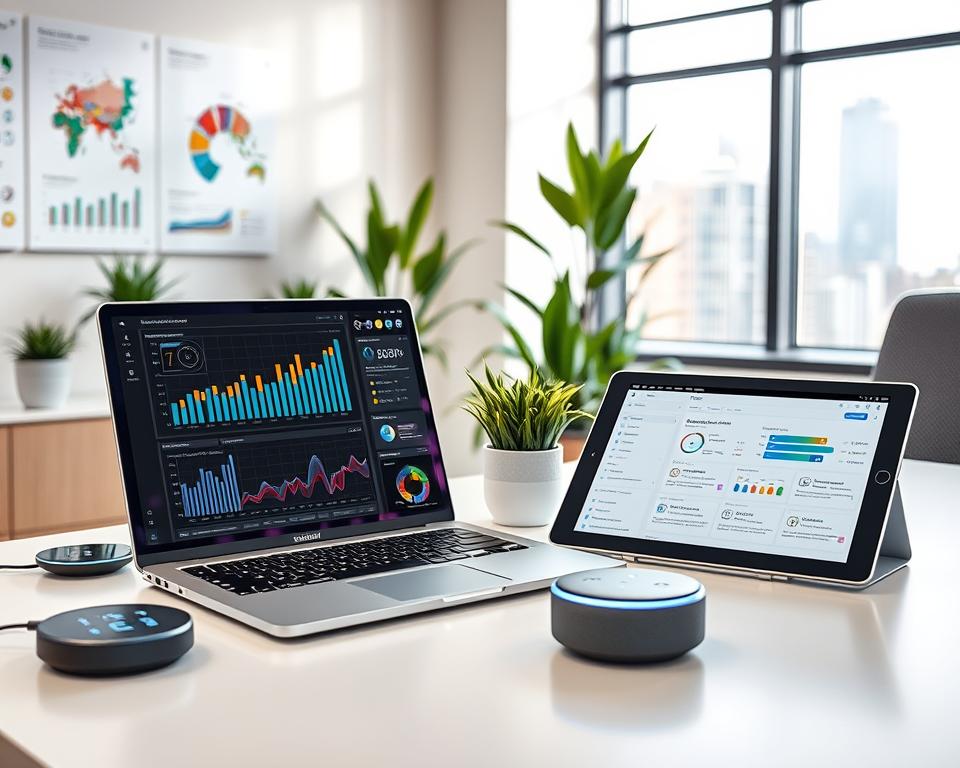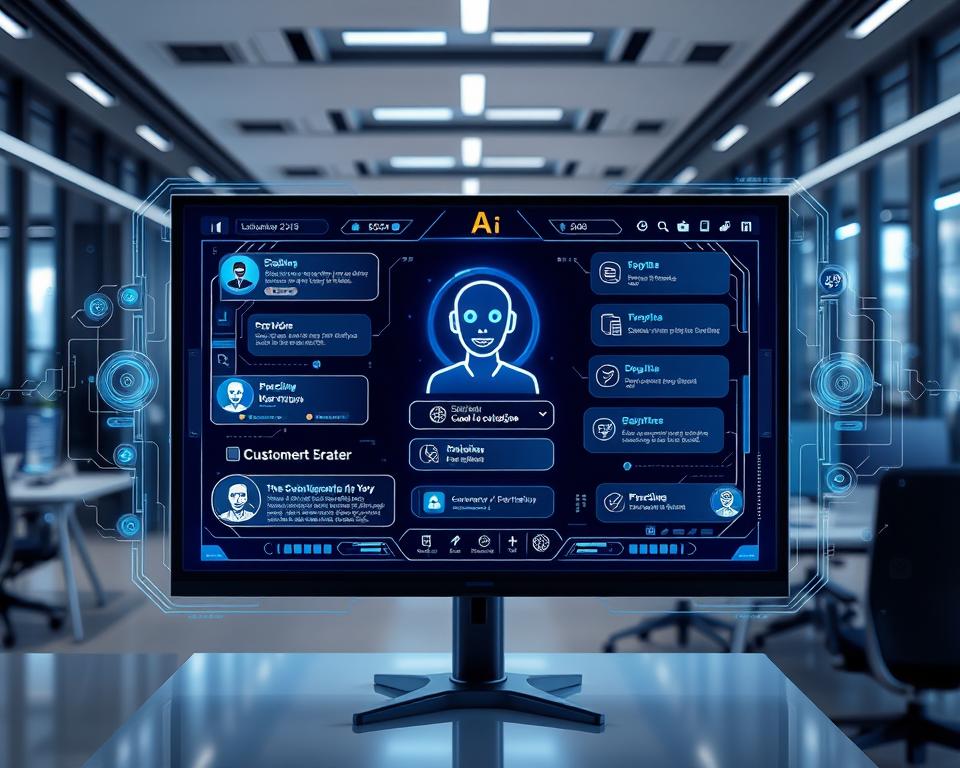In today’s fast-paced business world, being efficient and productive is key. Luckily, artificial intelligence (AI) has brought many new tools to the table. These tools can change how businesses work, from making processes smoother to improving customer service.
Businesses need to stay ahead of the competition. Using AI tools is now a key part of their growth plans. These advanced technologies do the boring work for you and give you insights. This helps companies make smart choices and keep up with market changes. By using AI, businesses can reach new heights of productivity and profit.
Table of Contents
Key Takeaways
- AI tools can significantly boost business productivity and efficiency
- Adopting AI solutions is essential for maintaining a competitive edge in today’s market
- AI technologies automate repetitive tasks and provide valuable data-driven insights
- Effective implementation of AI can lead to increased profitability and growth
- Understanding the transformative potential of AI is crucial for modern business success
Understanding AI Tools in Modern Business Operations
The growth of business AI technology has been amazing. It has moved from simple tasks to helping with efficiency, cutting costs, and better decision-making. This change is seen across many industries.
The Evolution of Business AI Technology
At first, AI was used for basic tasks like automating data entry. But now, it can handle complex tasks. It can understand language and predict outcomes, helping businesses in many ways.
Key Benefits of AI Implementation
- Increased efficiency: AI can do tasks that take a lot of time, letting employees work on important projects.
- Cost reduction: Using AI can save a lot of money by making operations more efficient and reducing the need for manual work.
- Improved decision-making: AI can analyze data and predict outcomes, helping businesses make better choices.
Current Market Trends in Business AI
More companies are using business AI technology than ever before. Industries like healthcare, finance, and retail are at the forefront. They use AI to improve operations, customer service, and stay ahead of competitors.
“AI is no longer a futuristic concept; it’s a reality that’s transforming the way we do business.”
As AI gets better, using these tools in business is becoming key. It helps companies stay competitive in a fast-changing world.
AI Tools for Business: Essential Solutions for Growth
Businesses today face a digital world where AI business solutions are key to growth. These smart technologies help improve productivity and make better decisions. They fit right into what businesses already do, making operations smoother.
Customer relationship management (CRM) systems are a big help. They use AI to better serve customers, leading to loyalty and more sales. CRM systems analyze data to help businesses tailor their services and marketing.
Predictive analytics platforms are another must-have. They use machine learning to predict trends and find new opportunities. With these tools, businesses can make smarter choices, use resources wisely, and stay competitive.
AI-powered process automation software changes how businesses work. It automates routine tasks, cuts down on mistakes, and lets employees do more important work. AI-driven process automation boosts efficiency and helps businesses grow.
| AI Tool | Key Functionality | Potential Impact on Business Growth |
|---|---|---|
| CRM Systems | Automated customer interactions, personalized marketing, data-driven insights | Improved customer retention, increased sales, enhanced brand loyalty |
| Predictive Analytics | Forecasting trends, identifying opportunities, mitigating risks | Informed decision-making, optimized resource allocation, competitive advantage |
| Process Automation | Streamlining repetitive tasks, reducing errors, improving efficiency | Increased productivity, cost savings, enhanced employee focus on strategic initiatives |
By using these AI business solutions in their digital transformation, businesses can grow and excel. They become more efficient and stay ahead in a changing world.
Transforming Customer Service with AI Chatbots
In today’s fast world, AI chatbots are changing customer service. They make operations more efficient, cut down response times, and improve customer happiness.
Implementation Strategies for Chat AI
Getting AI chatbots to work well needs a good plan. First, figure out what your customer service needs are. Then, pick the right chatbot platform, like Intercom or Zendesk. Make sure the chatbot fits with your current service setup.
Measuring Chatbot Performance
- Watch how happy customers are, how often problems get solved, and how quickly they get help. This shows if your chatbots are doing their job.
- Keep an eye on chatbot talks and listen to what customers say. This helps you make the chatbot better over time.
Cost-Benefit Analysis of AI Customer Service
AI chatbots can save a lot of money by cutting down on human customer service. But, you need to think about the upfront and ongoing costs. Look at how much you save, how happy customers are, and how efficient you become when you do a cost-benefit analysis.
| Metric | Average Improvement |
|---|---|
| Customer Satisfaction | 20% increase |
| First Contact Resolution | 35% increase |
| Response Time | 45% decrease |
| Cost Savings | 30% reduction in customer service costs |
By using AI chatbots, companies can change their customer service for the better. They can work faster and make customers happier. As more companies want customer service automation, knowing how to measure chatbot performance metrics is key to getting the most out of this new tech.
Data Analytics and AI: Making Informed Decisions
In today’s digital world, making decisions based on data is key for businesses to stay ahead. AI-powered analytics tools help companies find valuable insights in big data. They turn this data into actions that help the business grow.
Tableau is a top tool for data visualization and business intelligence. It lets users dive into, analyze, and share data insights easily. Power BI, from Microsoft, offers real-time data and interactive reports. IBM Watson Analytics is great for big businesses, with advanced business intelligence and predictive analytics.
These tools help businesses make better choices by finding patterns, trends, and predicting the future. By using data and AI, companies can improve operations, customer service, and growth.
“The ability to take data—to be able to understand it, to process it, to extract value from it, to visualize it, to communicate it—that’s going to be a hugely important skill in the next decades.” – Hal Varian, Chief Economist at Google
As data keeps growing, the need for strong AI-powered analytics will too. By using these tools, businesses can unlock their data’s full potential. This leads to informed decisions and long-term success.
AI-Powered Project Management Tools
In today’s fast-paced business world, AI project management tools are changing how teams work together. They use artificial intelligence to improve task automation, team collaboration, and resource allocation.
Task Automation Features
AI tools can automate repetitive tasks, saving your team’s time. They handle scheduling, task assignment, and tracking. This lets your team focus on the project’s strategy.
Team Collaboration Enhancement
Good team collaboration is key to project success. AI tools help teams communicate and work together better. They analyze team dynamics and offer insights for better teamwork.
Resource Allocation Optimization
AI tools are great at allocating resources. They use data to suggest the best resource use. This ensures your team has the right skills and tools for success.
| AI Project Management Tool | Key Features | Pricing |
|---|---|---|
| Asana | Task automation, team collaboration, resource allocation | Free plan, paid plans starting at $10.99/user/month |
| Trello | Kanban-style boards, task automation, team collaboration | Free plan, paid plans starting at $5/user/month |
| Monday.com | Customizable workflows, task automation, resource allocation | Paid plans starting at $8/user/month |
Using AI project management tools can make your business more efficient. It leads to better collaboration and resource use. This helps your projects succeed more.
“AI-powered project management tools have revolutionized the way we approach complex projects, streamlining processes and empowering our teams to work smarter, not harder.”
Marketing Automation and AI Integration
In today’s digital world, businesses are using AI to change their marketing. They’re making their processes smoother, making customer experiences more personal, and getting better results. This is thanks to AI marketing automation.
AI helps businesses segment their customers better. It uses data and machine learning to group people based on who they are and what they do. This means marketing can be more tailored to each person, making it more effective.
Tools like HubSpot, Marketo, and Salesforce Marketing Cloud are at the forefront of this change. They use AI to handle tasks like finding new leads, sending emails, and managing social media. This lets marketing teams focus on the big ideas and creative work.
Using AI and marketing automation really helps businesses make more money. They see better customer engagement, more sales, and higher returns on investment. As more people want personalized marketing, using AI to automate marketing will be key for businesses to stay ahead.
| Platform | Key Features | Target Audience |
|---|---|---|
| HubSpot | Lead scoring, email automation, social media management, website optimization | Small to medium-sized businesses |
| Marketo | Account-based marketing, predictive lead scoring, multi-channel campaign management | Mid-to-large enterprises |
| Salesforce Marketing Cloud | Customer data unification, personalized messaging, real-time campaign optimization | Large enterprises |
AI Tools for Financial Management and Forecasting
AI tools have changed how businesses handle their money. They offer more than just accounting, with predictive analytics, budget help, and risk checks. This means companies can make better choices and avoid financial problems.
Predictive Analytics Applications
AI tools for predicting finances are key for planning. They look at past data and current trends to forecast future money and risks. This helps businesses get ready for changes and make smart money choices.
Budget Optimization Tools
AI tools for budgeting make financial work easier. They use smart learning to handle tasks like tracking expenses and planning budgets. This saves time and helps find ways to save money, making businesses more profitable.
Risk Assessment Systems
AI systems for risk management are vital for keeping finances stable. They look at many data points to spot threats and weaknesses. This helps businesses avoid risks, follow rules, and protect their money.
More and more businesses are using AI financial management tools. They see real benefits, like better decisions from predictive analytics and safer finances from risk assessment systems. AI is changing how companies manage money and plan for tomorrow.
Streamlining HR Processes with AI Solutions
In today’s fast-changing business world, HR plays a key role. AI is changing how HR handles tasks, from finding new employees to keeping current ones happy. With AI in HR, companies can make their HR work more efficient. This leads to cost savings and a happier team.
Embracing AI-Driven Recruitment Automation
AI is making a big difference in recruitment automation. Smart algorithms can sift through job applications and find the best candidates. This lets HR teams focus on bigger tasks. Tools like Workday and SAP SuccessFactors help find the right people quickly and accurately.
Enhancing Employee Engagement with AI
Keeping employees happy and motivated is key to success. AI tools, such as those from BambooHR, help understand employee engagement. They analyze feedback and help make work better for everyone. This way, HR can make decisions based on real data, improving the work environment.
| AI Tool | Key Features | Benefits |
|---|---|---|
| Workday |
|
|
| SAP SuccessFactors |
|
|
| BambooHR |
|
|
As AI in HR grows, companies will see big improvements. They’ll be more efficient, happier, and more successful. HR can become a key driver of innovation, helping businesses thrive.
AI-Enhanced Content Creation and Management
In today’s digital world, content is everything. Companies need to keep making engaging, top-notch content to keep customers interested. Luckily, AI tools are changing how we create and manage content, making it better and faster.
Writing Assistance Tools
Tools like Grammarly and Copysmith are big help for businesses. They check grammar, spelling, and style as you write. They also suggest better ways to say things, helping writers make great content fast.
Content Optimization Features
AI also helps with making content better. It looks at how well content does, finds important topics, and suggests ways to get more people to see it. This means businesses can make sure their content is seen by the right people and works well.
Social Media Management
AI is also key for managing social media. Tools like Hootsuite help schedule posts, watch for mentions of your brand, and give insights to improve your strategy. This makes social media work easier and helps businesses look good online.
“AI-powered content creation and management tools are changing digital marketing. They help companies make better content and connect with their audience.”
As more people want unique, high-quality content, businesses using AI will do well. They’ll be able to make content that really speaks to their audience.
Security and Privacy Considerations for AI Tools
Businesses are using AI tools more to make work easier and better. But, they must focus on AI security and data privacy. These are key to keeping everyone’s trust.
Keeping data safe is a big challenge with AI. AI deals with lots of personal and financial info. It’s vital to use strong data privacy steps like encryption and access controls. Also, following rules is important.
| Key Considerations | Strategies for Mitigating Risks |
|---|---|
| Cybersecurity Vulnerabilities |
|
| Regulatory Compliance |
|
| Ethical Considerations |
|
By tackling AI security and data privacy early, companies can use AI fully. They can also keep their stakeholders’ trust.
“Securing AI systems and protecting data privacy are critical to building trust in the technology and ensuring its responsible use.”
ROI Measurement for AI Business Tools
Measuring the return on investment (ROI) for AI business tools is key. It shows the value of these technologies. By looking at performance metrics, success stories, and planning, companies can choose wisely.
Performance Metrics
When checking AI tool ROI, look at these metrics:
- Improved efficiency and productivity
- Cost savings from automation and process optimization
- Enhanced customer satisfaction and loyalty
- Increased revenue from data-driven decision-making
- Reduced risks and improved compliance
Success Case Studies
Real-world success stories offer insights into AI ROI. For instance, a top e-commerce site boosted conversion rates by 30% with AI. A financial firm cut fraud detection time by 25% with AI.
Investment Planning
Creating a strategic investment plan is vital for AI ROI. It involves looking at costs, benefits, and aligning with goals. A data-driven approach ensures a positive ROI and unlocks AI’s full potential.
| AI ROI Metric | Average Improvement |
|---|---|
| Operational Efficiency | 25% increase |
| Customer Satisfaction | 18% increase |
| Revenue Growth | 12% increase |
| Cost Savings | 19% reduction |
By measuring AI ROI, companies can make smart choices. They can justify their investments and unlock AI’s power.
Future Trends in Business AI Technology
The business world is diving into the power of artificial intelligence (AI). Experts see a bright future for this technology. It will make companies more efficient, quick, and focused on customers.
Edge AI is becoming a big deal. It moves AI closer to data, making decisions faster. This change will impact industries like manufacturing, transport, and healthcare. It will help them make quick, smart choices.
The Internet of Things (IoT) is also growing. With edge AI, businesses can create smart systems. These systems can change and meet new needs.
Explainable AI is another exciting area. It makes AI systems clear and reliable. As AI becomes key for big decisions, clear systems are more important. This will help build trust in AI and let companies understand their AI insights better.



















